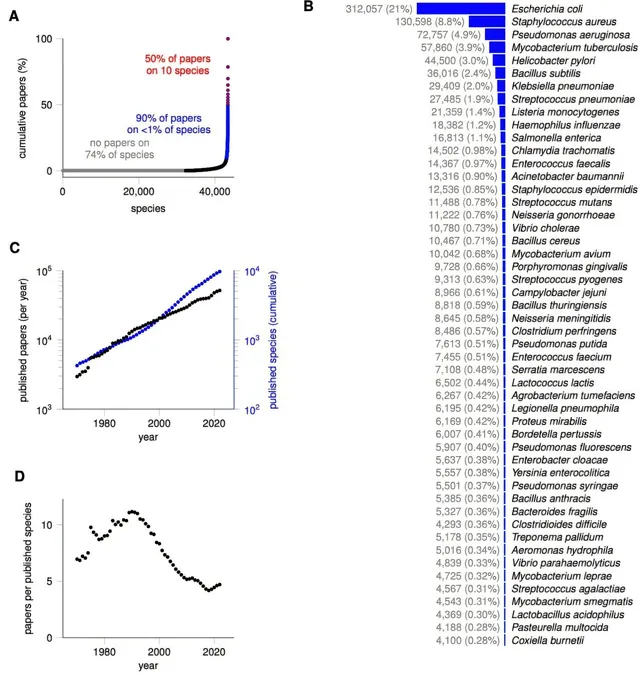
Uncharted Waters of Microbiology: The Shocking Truth About Bacterial Research!
2025-01-13
Author: Mei
Groundbreaking Revelation
In a groundbreaking revelation, a biomedical engineer from the University of Michigan, Paul Jensen, has uncovered a startling disparity in the scientific research landscape related to bacteria.
A Shocking Reality
Despite the massive diversity of over 43,000 known bacterial species, it appears that only a minuscule fraction has garnered significant attention in scientific literature. Jensen’s meticulous investigation into the PubMed database revealed a shocking reality: a mere 10 species of bacteria account for about half of all published research papers.
The Dominance of E. coli
This skewed focus predominantly centers around Escherichia coli, a microorganism that has been not only extensively studied but also utilized as a model organism to glean insights into various biological processes.
The Research Gap
However, the vast majority of bacterial species remain in obscurity, with around 75% of them lacking any recorded research efforts. Intriguingly, Jensen's quest began as he explored the potential of employing a large language model (LLM) to integrate existing studies on specific harmful microorganisms, particularly Streptococcus sobrinus—known for its role in tooth decay.
Insufficient Studies
To his dismay, he discovered only a handful of studies available, which proved insufficient for training an LLM. This further underscores the limitations in current microbiological research and the potential for discoveries waiting to be made.
Overwhelming Focus on E. coli
Furthermore, his analysis indicated that papers focused on E. coli constitute a staggering 21% of all microbiological research within the PubMed database.
A Call to Action
This trend is not just an anomaly in one repository; Jensen suggests that similar patterns would be observed across other scientific databases. His findings raise an urgent call for the microbiology community to broaden its horizons and redirect research efforts towards the wealth of unexplored bacterial species and microorganisms.
Future Implications
The implications of Jensen's research are profound: there are vast ecosystems of bacteria that could possess untapped potential for advancements in medicine, biotechnology, and environmental science.
Conclusion
As researchers begin to diversify their focus, we may soon uncover revolutionary insights that change our understanding of life at the microscopic level. Stay tuned as the microbiology world opens up to countless possibilities, and prepare for a future where the microbial universe is fully explored—because what we don’t know might just hold the key to the next scientific breakthrough!
 Brasil (PT)
Brasil (PT)
 Canada (EN)
Canada (EN)
 Chile (ES)
Chile (ES)
 Česko (CS)
Česko (CS)
 대한민국 (KO)
대한민국 (KO)
 España (ES)
España (ES)
 France (FR)
France (FR)
 Hong Kong (EN)
Hong Kong (EN)
 Italia (IT)
Italia (IT)
 日本 (JA)
日本 (JA)
 Magyarország (HU)
Magyarország (HU)
 Norge (NO)
Norge (NO)
 Polska (PL)
Polska (PL)
 Schweiz (DE)
Schweiz (DE)
 Singapore (EN)
Singapore (EN)
 Sverige (SV)
Sverige (SV)
 Suomi (FI)
Suomi (FI)
 Türkiye (TR)
Türkiye (TR)
 الإمارات العربية المتحدة (AR)
الإمارات العربية المتحدة (AR)